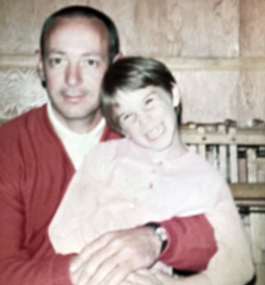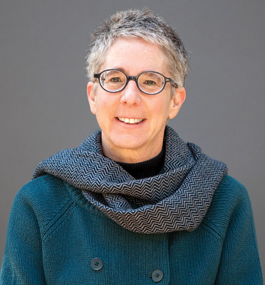‘An All-Out Assault on the Brain’
Literature and science helped Cindy Weinstein ’82 reclaim the father she lost to early- onset Alzheimer’s.

Courtesy Cindy Weinstein
Jerry and Cindy Weinstein in 1966
by Laura Gardner, P’12
Cindy Weinstein ’82 loved all the ordinary things that made her dad her dad.
“He smelled of Old Spice,” the Eli and Edythe Broad Professor of English at Caltech writes in her book “Finding the Right Words: A Story of Literature, Grief and the Brain” (Johns Hopkins University Press, 2021). “His favorite alcoholic drink was vodka with grapefruit juice. He loved coffeecake. When people asked him his name, he would always say ‘Jerald, with a J, not a G.’ He was a really good whistler.”
Jerald Weinstein — known as Jerry — was diagnosed with early-onset Alzheimer’s in 1985 at age 58. At the time, Cindy was a 25-year-old PhD student in English literature at Berkeley. Eventually, Jerry wouldn’t be able to read James Michener’s “The Source,” the novel that sat on his nightstand for years; run his electric-appliance business; indulge his gambling hobby; or remember his favorite singer, Frank Sinatra. A dozen years after his diagnosis, he would die in a nursing home, “zombified by medicine,” Weinstein says.
But this grim picture describes only a small facet of Jerry’s life. In Weinstein’s book — part memoir, part scientific primer, part literary criticism — she recaptures her whole father, both “the catatonic one and the beautifully aware one,” she writes.
Among the devastating and happy memories she shares, one seems particularly illustrative. It was 1982, three years before Jerald’s diagnosis, and he was at the San Francisco airport saying goodbye to his daughter, who was about to begin her PhD studies at Berkeley. Jerry cried inconsolably, trembled and held Cindy tight. She assured him they would see each other over the winter break.
In retrospect, she believes the moment foreshadowed the looming catastrophe of Alzheimer’s. “Our goodbye wasn’t about me at all,” she writes. “It was about him. For all of my talk about returning to him, he would not be able to return to me. We had gone inland, but he was already falling off the cliff. My turn would come a few years later.”
“Finding the Right Words” is co-authored by Bruce Miller, a neurologist at the University of California, San Francisco. Chapters begin with Weinstein’s narrative; Miller responds with explanations of Weinstein’s father’s descent into dementia from a scientific viewpoint, using straightforward language that never obscures the family at the center of the story.
Together, Weinstein and Miller describe the emotional, intellectual and neurological landscape carved by dementia. For example, as his sense of self slipped away, Jerry would constantly pull his wallet from his pants pocket and look through it, “as if trying to find himself in the documents that named him, but couldn’t convey to him what he was really looking for, which was, of course, himself,” Weinstein writes.
Weinstein began writing her book when she was 58, her father’s age at diagnosis, more than two decades after his death. Though she didn’t realize it at the time, she says, the year she spent reading memoirs and learning about brain health was her version of sitting shiva, the Jewish ritual of mourning. She studied neurology at UCSF as a fellow in the Global Brain Health Institute, learning about dementia’s effect on the brain. And she dug into beloved novels by Melville, Faulkner, Twain, Hawthorne and others.
Studying neurology and literature, Weinstein says, enabled her to shift her focus from her own relationship to her father’s illness to her father’s relationship to his illness — and to the disease itself. “In getting inside his brain, I can get outside of mine and get out of the way,” she writes. “I have been in the way for too long.”
Jerry was diagnosed with early-onset Alzheimer’s with the logopenic variant, meaning he lost language first. It’s a particularly cruel detail for Weinstein, who has dedicated her professional life to language and literature.
“Irony is the literary term that perhaps best describes my 20-something life in the 1980s,” she writes. “Irony, as I experienced it, was the autobiographical fact of experiencing the best years of one’s life at the same time as experiencing the worst. Irony was getting a PhD in the Berkeley English department […] at the same time as dealing with (or not dealing with) my father’s Alzheimer’s diagnosis.”
Alzheimer’s may begin with language or memory problems, then becomes a relentless progression of loss. Spatial confusion and behavioral change are hallmarks. “Depression and mood changes are actually part of the disease itself,” says Weinstein. The person with Alzheimer’s “is just not equipped to manage any of this. Basically, it’s just an all-out assault on the brain.”

Van Urfalian
Cindy Weinstein ’82
page 2 of 2
Though a dementia cure remains elusive, science has progressed dramatically since the days when the disease and its victims were little understood. Weinstein says her father lived in a series of depressing nursing homes, despite her mother’s relentless efforts to improve his quality of life.
Like Ishmael, Melville’s famous narrator in “Moby-Dick,” Weinstein says she was surrounded by “the wreckage of death” for a long time before mustering the strength to confront it.
Learning about the science of dementia, even on a basic level, at the Global Brain Health Institute gave her the wherewithal to understand how the disease enveloped her father. “I always understood him, and that’s why I could write the book to begin with,” she says. “But what I understand better now, because I know a little about neurology and because Bruce explained so much to me, is just what my father was up against.”
Reclaiming memories of her father, both happy and sad, forms the heart of “Finding the Right Words,” in which Weinstein reconnects with her healthy father, the one she knew before dementia.
“This book allowed me to celebrate my dad,” she says. “Having remembered my father, having kept my word that he is safe in the pages of this book, I can at last say goodbye to him.”
